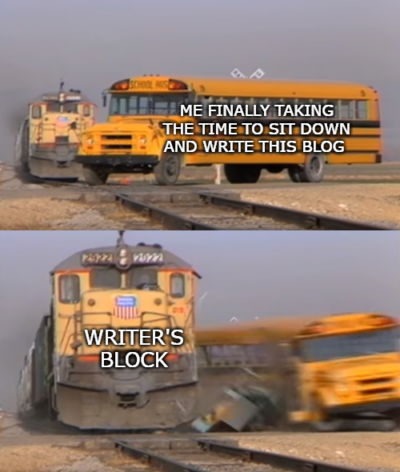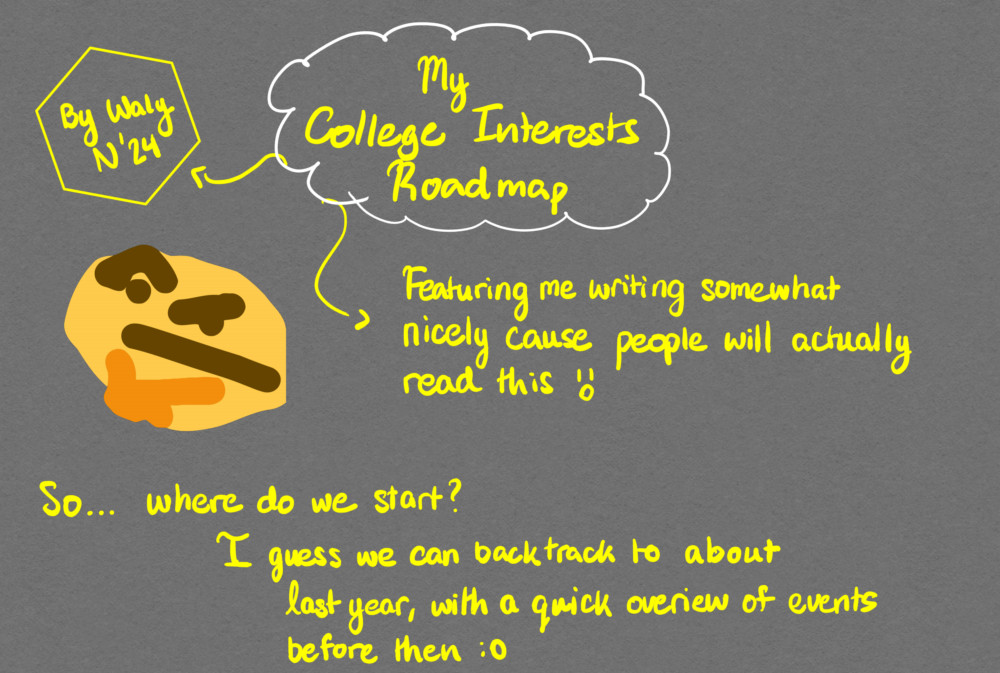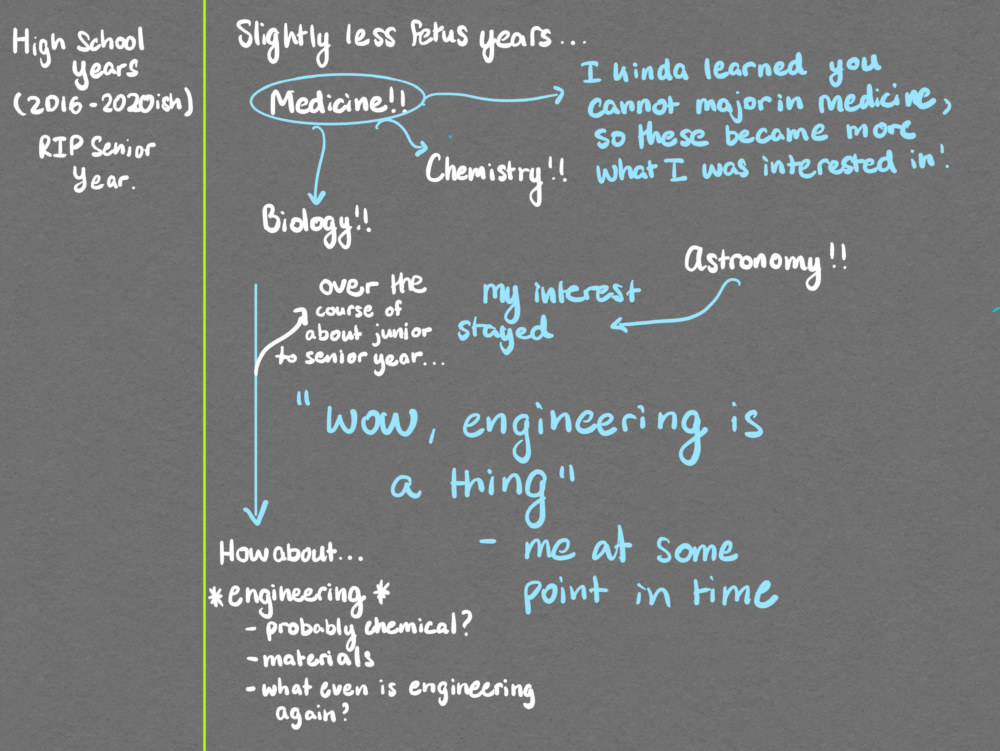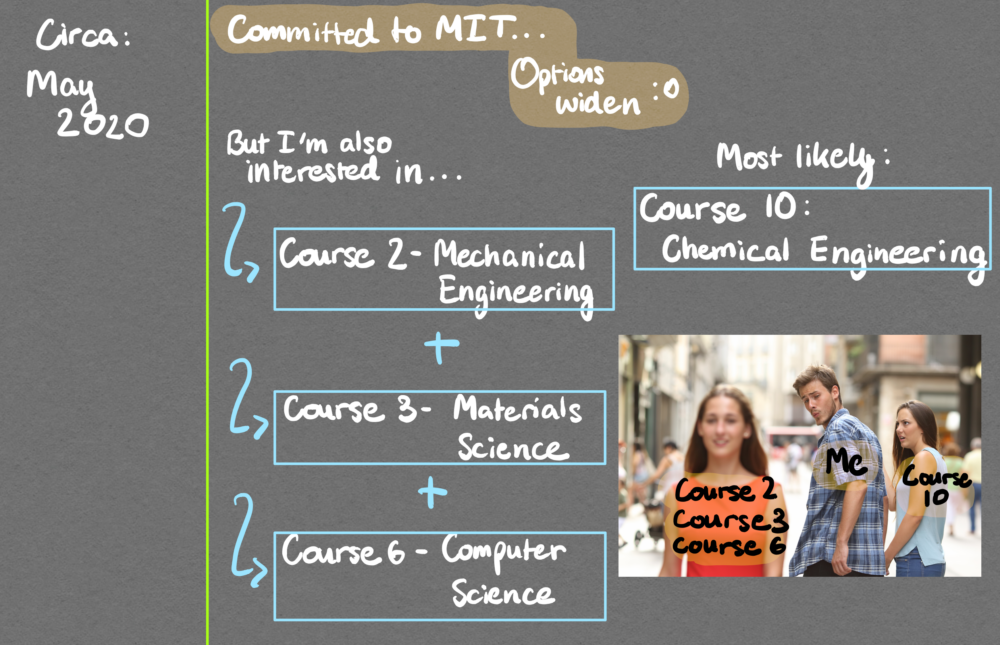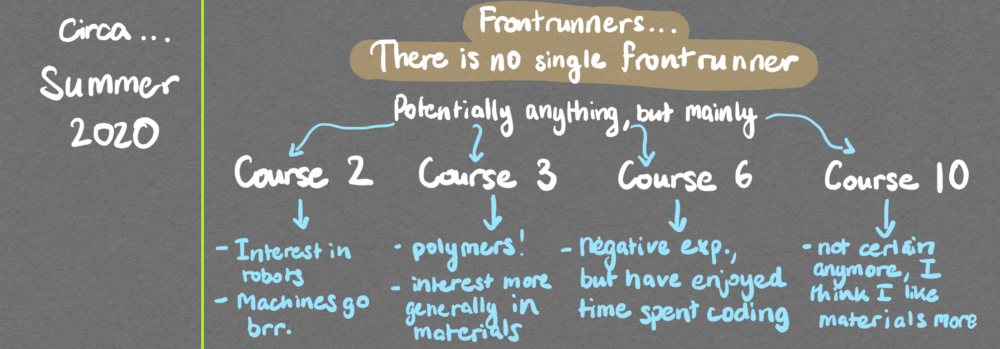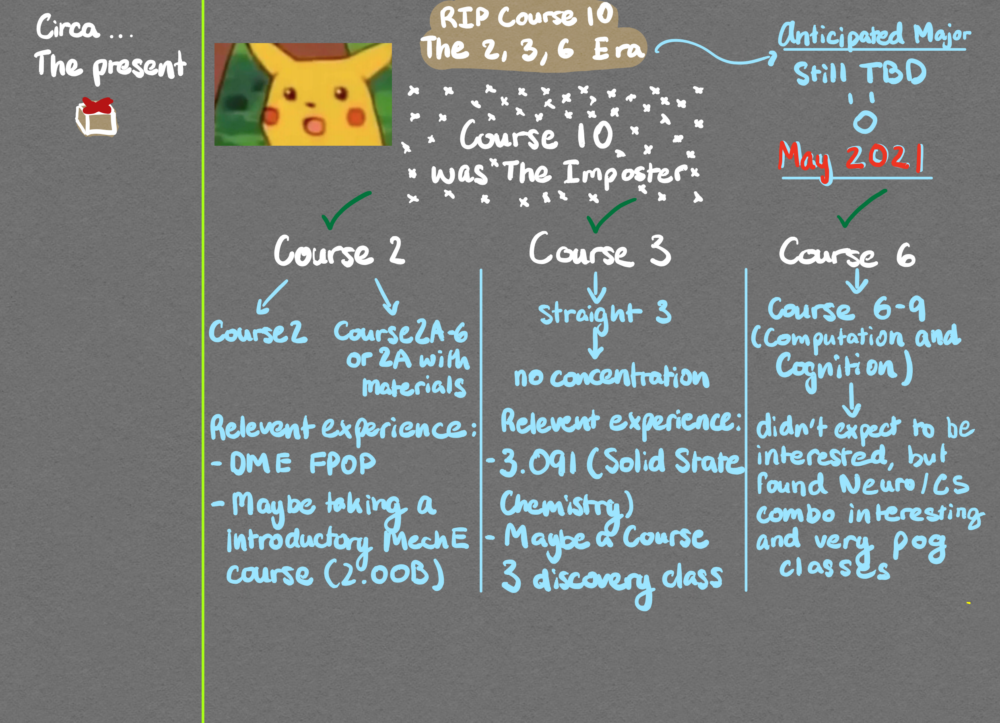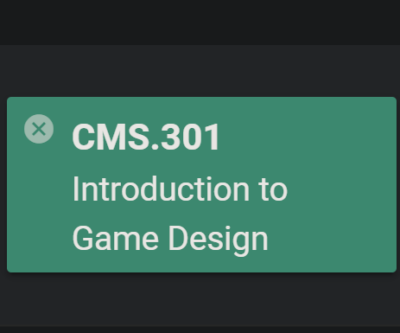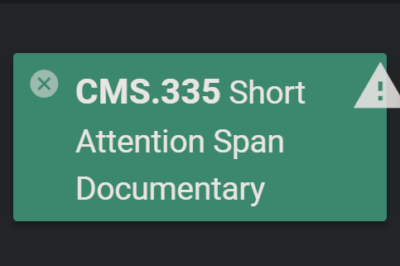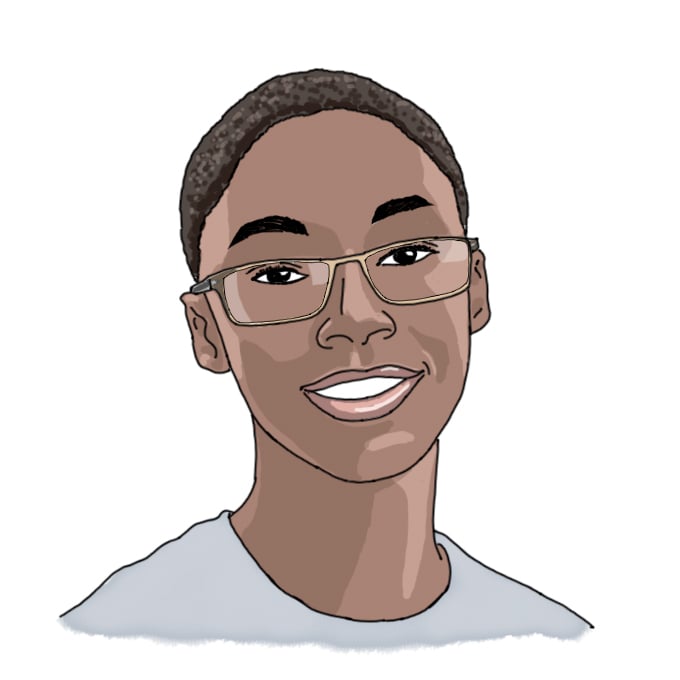
a major road to trouble by Waly N. '24
exploring interests as a baby beaver
Col·lege ma·jors
(noun) A term that invokes pain and, as compensation, newfound freedom in class selection
For many weeks, I couldn’t think of a good way to write this blog about all the stuff that comes to mind when I think about picking interesting courses and more broadly, a major. I had a pretty clear idea of how I wanted to approach this, but couldn’t pinpoint a simple way or the right medium to use. A way that would make it easy to understand, especially from a non-MIT point of view. In a nutshell, my thought process could be summed up like this:
This probably can be attributed to how course selection in college is a double-edged sword. One side of this sword is that the large scope of courses you can take allows you to fulfill your greatest interests and desires, free of constraints. The flexibility of course choice regarding your major, minor, or humanities concentration is pretty liberating. The other side of the sword is that the task of managing to fit all these interests into a little over 3.5 semesters of MIT is daunting. There are too many things to do and just not enough time.
Many questions came into my head as I toiled on how to crack this blog.
Do I straight-up word vomit interesting stuff I have found at MIT and call it a day?
Do I make a visualization of all these things that appeal to the eye?
Do I thoroughly explain every major/minor/concentration-related thought that has ever so slightly come into my head?
It led me to think back to being a high schooler and how one of the things that worried me about college was the need for a refined major. In many instances, inside and outside of college, it feels like you can be chained to what your current interests are and that there is little room for change. By not coming in with a refined major, MIT students seemed to have lots of wiggle room, and that was something I very much enjoyed seeing. Now being an MIT student, I wanted to show my perspective on the fluidity of interests and how college has led me to not pressure myself to stay in one lane or area. It has pressured me to avoid some zones tho…01 I will never major in math :)
Indecisive as ever on how to approach this, I wound up answering a mix of these 3 preceding questions when I tried to make a simple outline of my blog that spiraled into a whole handwritten piece.
As a result, welcome to the starting point of this college interest roadmap. Featuring way too much time spent on good handwriting. Let’s hope you stay for the trip :)
Now, as background info before I start delving into MIT times, let me just give a brief overview of interests before I wound up at the Institute.
Fetus Era
For the vast majority of my existence as a human bean, I’ve loved medicine and astronomy. As a kid, I had a little poster that said, “The Sky is not the limit” with a space-themed background.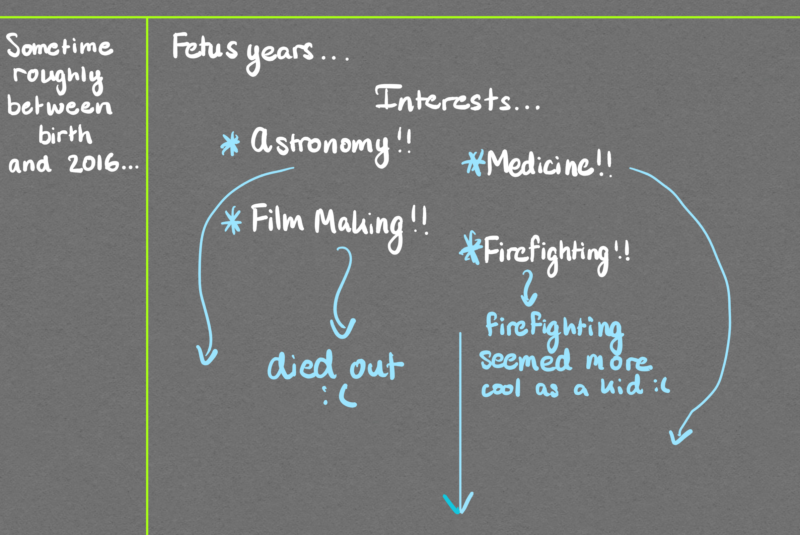
Sproutling Era
Around starting high school, I realized that you couldn’t just major in medicine, and for a while, I felt I would just major in something that was “pure” science. Like Bio or Chem. Or if I pursued more Astro related stuff, maybe I would major in astronomy or physics?02 Ha. How cute and naïve I was. These seemed like the most likely trajectories.
But over time, these seemed to materialize as passions rather than things I could see myself studying/doing. The problem was that subjects like bio, chem, and physics felt very abstract. If I were to major in any of those fields, I couldn’t see what I would do. In a sense, I craved something more tangible to me than these fields.
Or maybe I realized that though I like the concept of medicine, I wasn’t fond of medical school. Or having people sue me. Who knows.
Sometime Sophomore/junior year, I got exposed to what engineering actually is and just realized how cool it was. Engineering was an abstract thing to me before then. It was just a field where people came together and built stuff like robots. A cool field, but one I couldn’t really gauge my interest in due to my limited experience. There weren’t many places to learn about engineering within the constraints of a high school schedule, but I eventually felt that engineering was what I would want to major in the most. It took some time trying to deduce what fields of engineering rocked my boat, though I felt fairly content about a few areas by the time senior year apps rolled around.
So now, onto the MIT chapters.
Those few months led to me planning on majoring in Chemical Engineering, which was the major I applied to/with virtually everywhere (including MIT). Though I admittedly spent way too much time googling “what is the difference between chemistry and chemical engineering” at the start. The summer before senior year, I worked on a science article where I talked a whole lot about polymers and how they can be linked to environmental purposes, so this experience made me so sure that I was making the right choice.
So after the tedious mess known as waiting for college decisions, losing senior year, and watching the US succumb to covidiots, I eventually committed to MIT. And this led me to explore a bit more into ChemE at MIT specifically. I already knew about the specific tracks that it had to offer and really liked the flexibility it offered in its program. There was a pure Course 10, Course 10 if Course 10 screamed that the mitochondria are the powerhouse of the cell (10B), and a flexible option (10C). Little did I know that searching too far would lead me down a rabbit hole of exploring every major that has ever existed.03 shout out to the dead Course 13
Soon, I was digging myself into a hole of finding everything interesting, which threw me quite a bit off course. Everything would have just been fine had I stayed in my ChemE lane, but no, I had to veer off into the
So, when I was exploring ChemE, 3 other engineeringish areas also caught my eye. To be fair, Material Science was always on my radar since it seemed interesting, but I thought it was a more specialized version of ChemE to some extent. Many schools didn’t have it as a major, and only as a specialization within ChemE, which added to my confusion about the field most likely.
For MechE, I wasn’t 100% certain what it entailed exactly, but I knew that I liked robotics, so based on that mundane reason, I decided to look more closely into it.
For Course 6, it was a mixed bag, but one I didn’t want to entirely throw out. I probably swore multiple times in high school I would never do CS after hating my CS class with a burning passion. My subsequent experiences with CS were meh, but I know that I enjoyed the experience of coding itself and working on projects with others. I felt that maybe I just had some unfortunate encounters with the subject, so it was not worth rejecting just yet.
At that point in time, my interest in Course 10 was still the greatest, but these just served as other things I wanted to look at.
If you didn’t guess it, soon enough, I became confused by all these options and was no longer certain what I wanted anymore. It turns out that when you spend all your time inside like a hermit crab cause of covid, you discover many things you didn’t realize. Like the fact that you are indecisive as heck. It was around this point in time where I found myself swaying a bit from Course 10 and more towards other options. I realized that maybe the parts of Course 10 I liked weren’t the whole story of Course 10. I liked the opening act, but some of the material in it left me feeling like:
I found that the parts of ChemE I liked seemed to be more concentrated in Course 3, especially since what interested me most was the properties of materials and how they could be used. Which probably is a toddler-level description of Course 3, but I digress. My interests in the other 2 majors stayed about stagnant, with Course 2 being at a slightly higher interest level than Course 6.
In this phase of the roadmap, a tool that helped me a lot was Courseroad, which is an MIT course ✨road-mapping✨ tool that lets you see what classes are in a major and make a 4-year schedule. I didn’t care too much about the 4-year scheduling portion of it because I felt that would be subject to so much change over time. But I really liked to see the material of classes. It was also nice to see what a snapshot in time could be like for these classes. For example, how would a potential Sophomore Fall look like? What would I take? What choices do I have for later on and electives?
So for each major I was pretty deeply interested in, I threw together a courseroad in the hopes of pushing myself closer to one direction. Unfortunately, I grew more attached to every field simultaneously. At least it was fun seeing the pretty colors for each major. I included some of the courseroads I didn’t lose thanks to being a person who doesn’t know how to save stuff properly.
Well, when I say I grew more attached to each field, that was not entirely true actually. When I was looking at the Course 10 classes, I felt less interested in the major to an extent. Not certain how to say this, but something just didn’t pass the vibe check. Course 10 wasn’t disqualified from the race of majors, but it certainly was leading anymore. If anything, it had fallen back a bit, while the others tightened their laces and raced ahead. Which ended up leading to my current major interest roadmap…
Circa November 2020. About a year turnaround since I applied to MIT as a… Course 10 major. And by this point, I wasn’t even planning on it being a major possibility. This raised the question of what went wrong? Or was it a matter of what went right?
Thinking about it, I feel that my interest in Course 10 might have been more constant than I thought. But as I explored new areas and interests, my passions for them surpassed that of Course 10. In a metaphorical race of the majors, when Course 10 was falling behind, it wasn’t necessarily slowing down. In reality, the other majors were simply accelerating. I found them to be more in my niche, and the hands-on experience I got in some of them pushed me in their respective directions. And hopefully, the upcoming experience I hope to get in the spring semester will be helpful as well.
For example, in course 2, I got to participate in the DME FPOP,04 a pre-orientation program led by the mechanical engineering department. where I got to toy around with an Arduino kit and make a semi-functional hand sanitizer dispenser. It was a pretty simple experience, but I really enjoyed it, swaying me a bit towards Course 2. In the upcoming spring semester, there is this class in Toy Product design I’ve been wanting to take way before even applying to MIT. Since it’s an introductory MechE course, hopefully it helps make a difference in choosing a particular major.
In Course 3, I’m currently taking 3.091, which is the Solid State Chemistry course. I opted to take it instead of taking 5.11105 a more general chem class, think AP Chem if AP Chem was on fire in ESG because I wanted to get a small dive into the material that is more Course 3 related. Though the class itself hasn’t swayed me towards Course 3 very much, I do find some of the content interesting, which I would say is a good thing.
In Course 6, I haven’t gotten any formal experience that has swayed me in a way yet. In the spring, I hopefully will, so looking forward to that helping to give me a better idea of whether I enjoy coding.
Now, amongst these 3, I’m still fairly undecided about exactly which direction I want to go in. And then there is even more to think about regarding specific branches/paths I can take with certain majors. Such as specializations in MechE/Robotics or subsets of Course 6 like 6-9, which is computation and cognition. But since I have till about May to make a choice, you can catch me procrastinating every second away looking at all the interesting aspects of each course. I’ll manage to be even slower at reaching a decision than Nevada counting ballots.
And with that, a sweet end to my college roadmap.
If only.
Humanities weren’t a thing.
By this point, you are most likely tired of me rambling on. You have most likely gotten up to get a snack or been distracted by youtube. Or you left this page, though I’m not certain of how you would be reading this.
So I’ll make this short and sweet…
Bonus Era: Humanities: Past and Present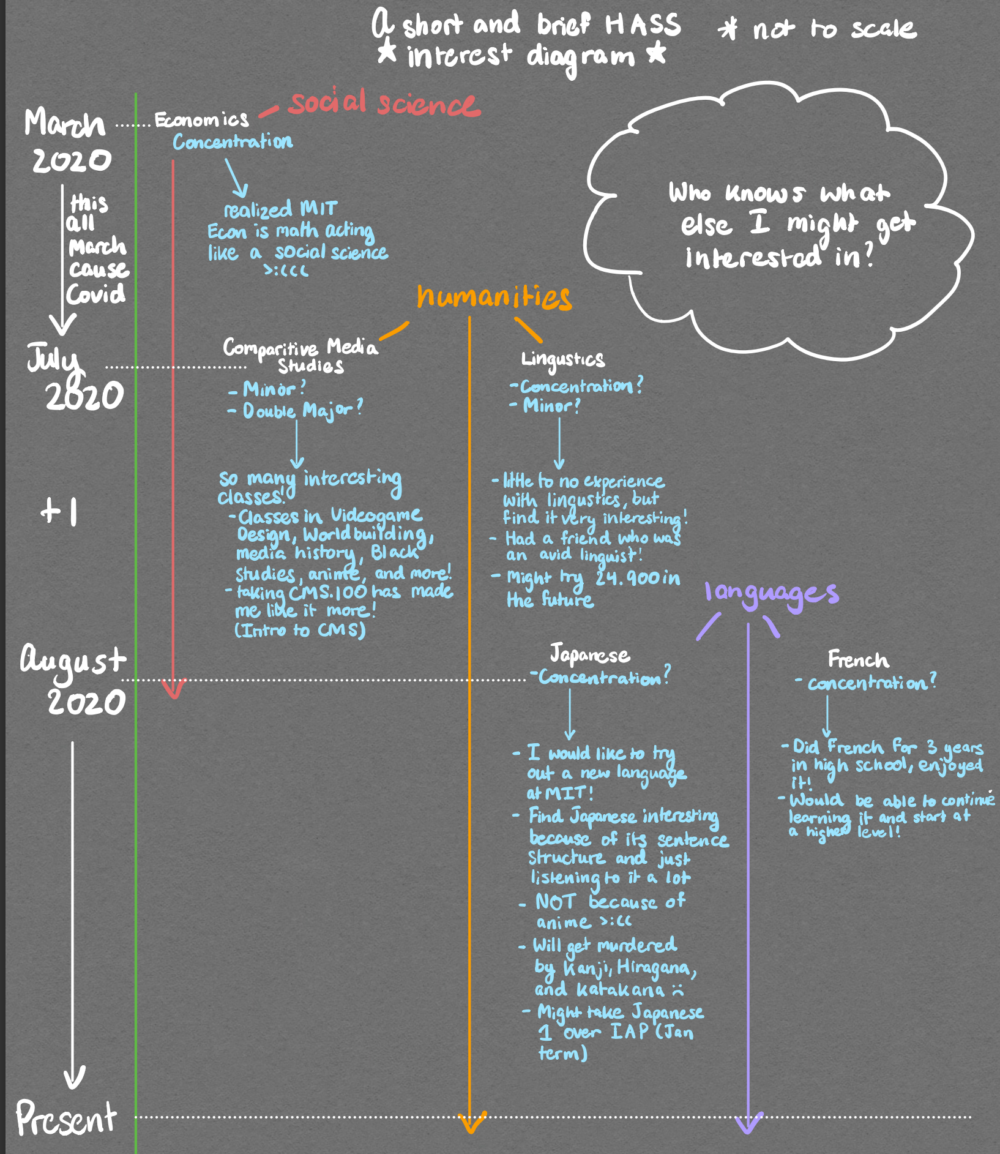
Economics
So after getting into MIT and taking AP Econ classes in senior year, I was like, “I’m pretty trash at this, but I seem to enjoy it, so may as well try it.” Unfortunately, little did I realize that the intro econ classes seem to be just math masquerading as a social science. I enjoyed the more conceptual side of econ, so this was not the best news to me. To gauge my interest a bit better, I’m currently taking a small discovery class in Econ, which is known as 14.009. Though I like the material, the content is difficult to stay focused on personally, so it’s solidified having an econ concentration as a nope for me.
Now when it comes to other potential concentrations in humanities subjects and languages, these are areas that I’m currently pretty fond of, though given my unpredictability, who knows what will actually happen.
Comparative Media Studies
Based on my current state of mind, this feels like a surefire choice. CMS covers many things I’m interested in and has such a wide range of classes. For example, you can take anything from
to
For my communication-intensive class requirement, I’m taking CMS.100, which serves as the intro class to the field. In the class, we’ve had many interesting conversations and essays,06 I wrote one about Avatar the Last Airbender! which has led me to like this field even more. I would double major in it if I had the space to do so without dying, but if I want to explore other areas, a minor or concentration would probably suit me much better.
Linguistics
I’ll be honest, I don’t know all too well what linguistics is, but it sounds really interesting and is something that I would be eager to try out. One of my friends in high school was an avid linguistics fan, so that was probably my first introduction to the area. In the future, I might try to take the intro linguistics course, 24.900, to see what it’s like. Sadly, this course runs at somewhat awkward times and is hard asf to get, so I’ll see what happens.
Japanese
So at one point in time, a thought crossed my head.
Wouldn’t it be cool to take a new language at MIT?07
acting like I won't pset till I drop
After giving that some thought, I felt that I would like to maybe try taking a Japanese beginner course and see how I like it. And before anyone accuses me of wanting to take classes in it to watch subbed anime without subs, rest assured, this is not the case. I was originally interested in Japanese and Russian long ago because of their fairly long-term involvement in space programs. I’ve been interested in the language way before I ever watched anime, and I almost took it in high school instead of the language that follows this section. I know that if I do take a course in Japanese, I will most likely suffer thanks to being so used to the roman alphabet, but at least it will be a fun death :)
French
After considering taking a new language, my head also jumped to another option: how about continuing a language I’ve been doing for about 3 years? Though there has been about a one year gap since I last took French, it might be interesting to continue it since I enjoyed it quite a bit in high school. I would also be able to likely start at a level higher than 1, which is pretty nice.
Regarding my specific humanities concentration(s), I have quite a bit of time to explore before I make a final decision, which is time I’ll greatly appreciate. Until then, time for some more soul searching and hard decisions.
- I will never major in math :) back to text ↑
- Ha. How cute and naïve I was. back to text ↑
- shout out to the dead Course 13 back to text ↑
- a pre-orientation program led by the mechanical engineering department. back to text ↑
- a more general chem class, think AP Chem if AP Chem was on fire back to text ↑
- I wrote one about Avatar the Last Airbender! back to text ↑
- acting like I won't pset till I drop back to text ↑
